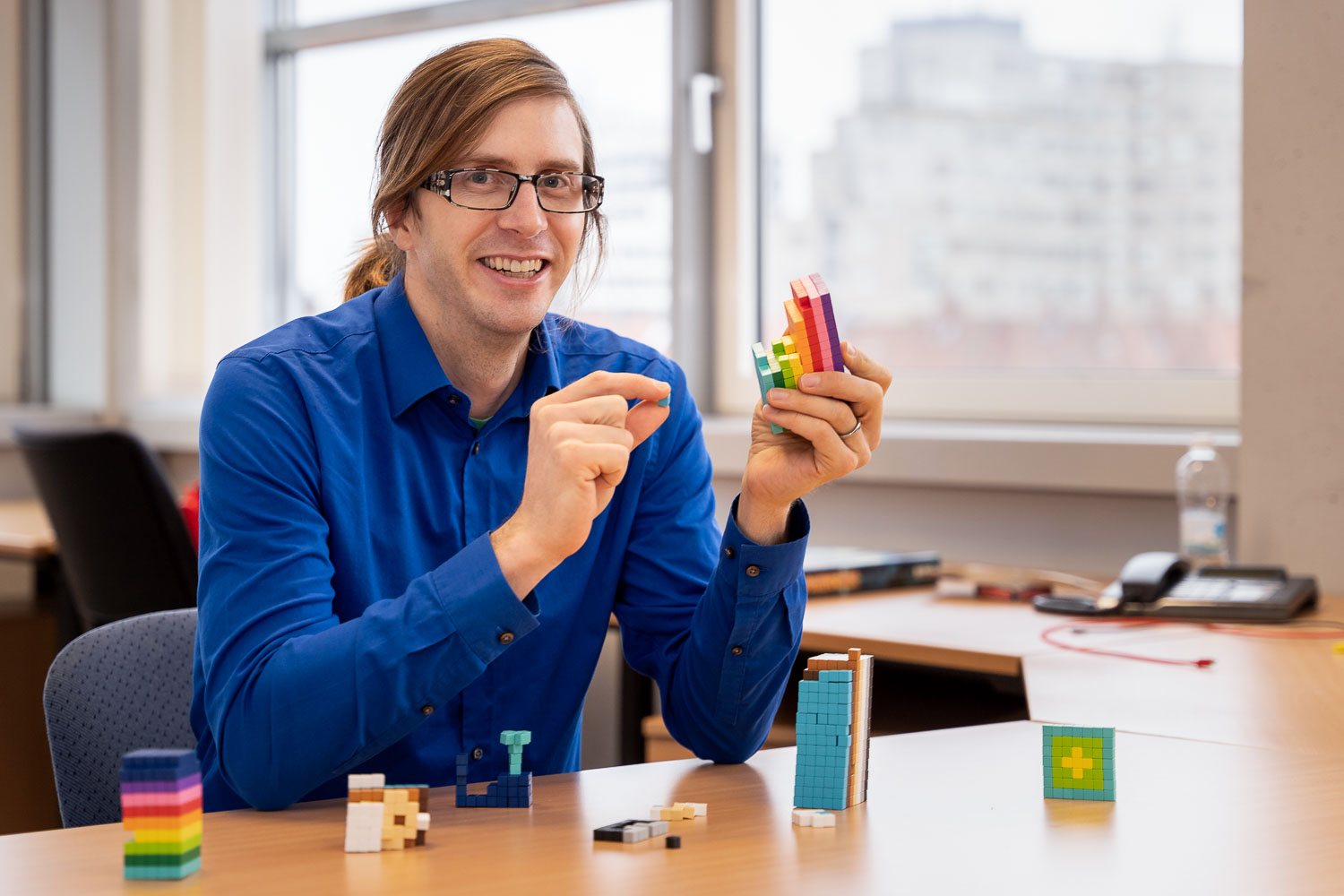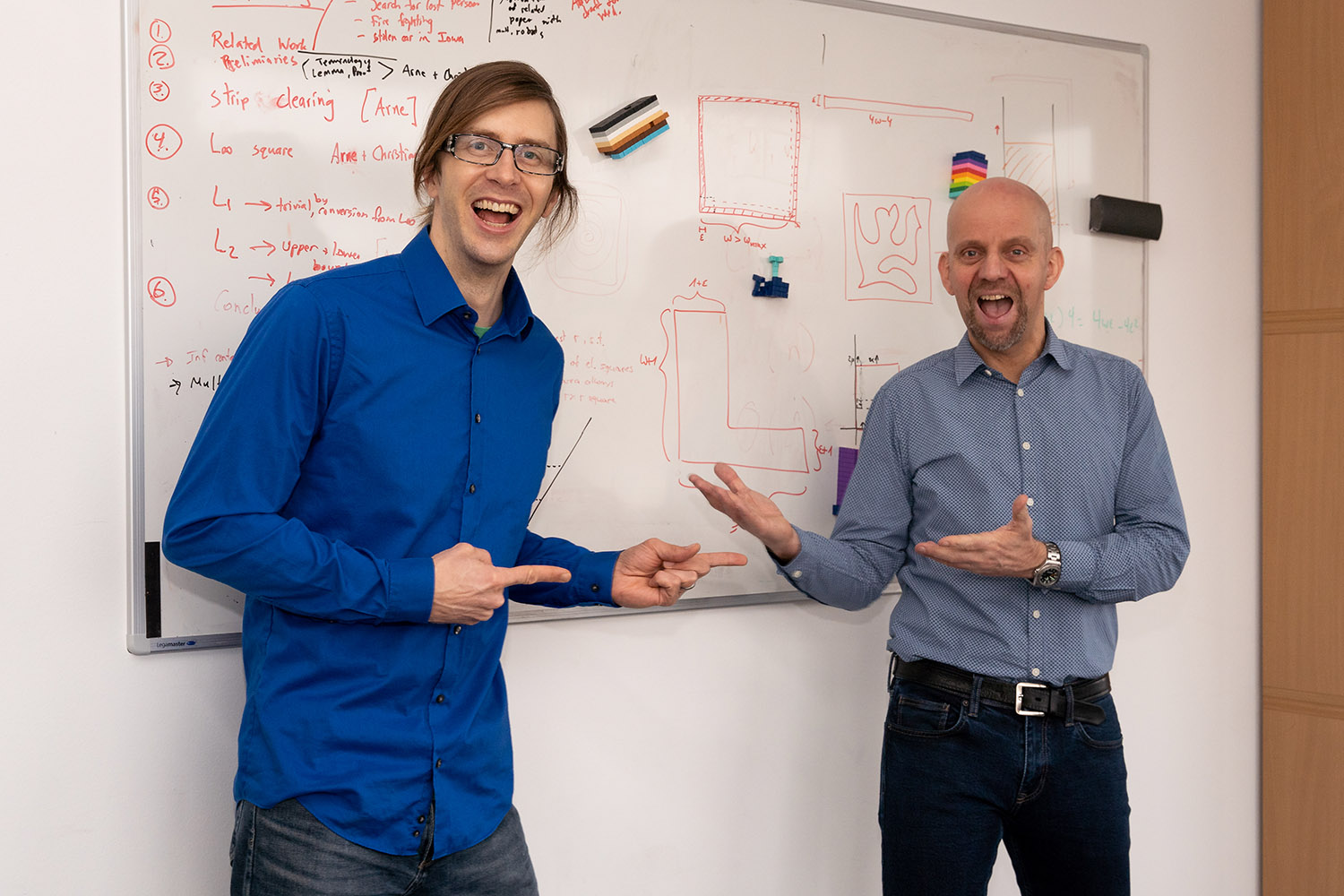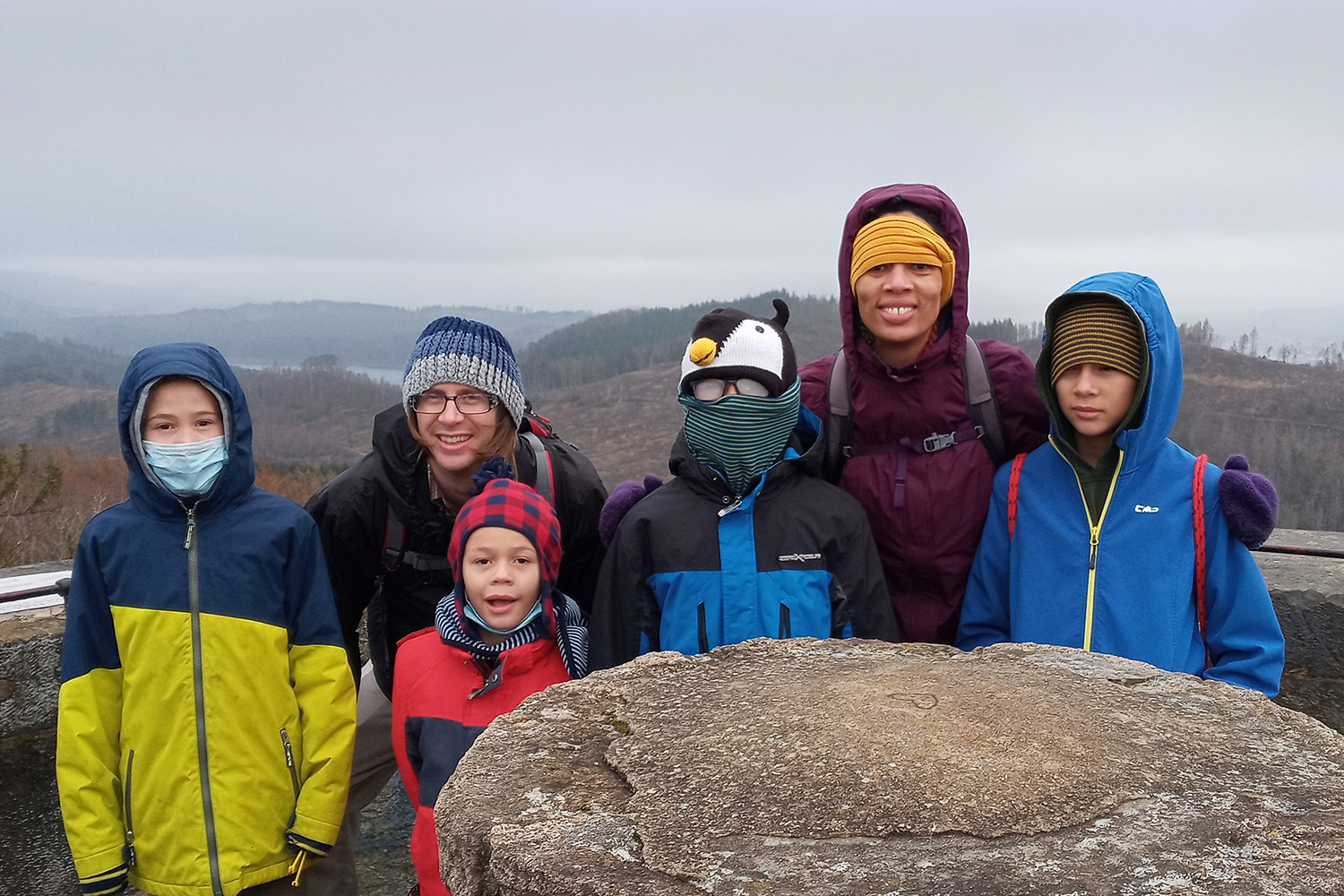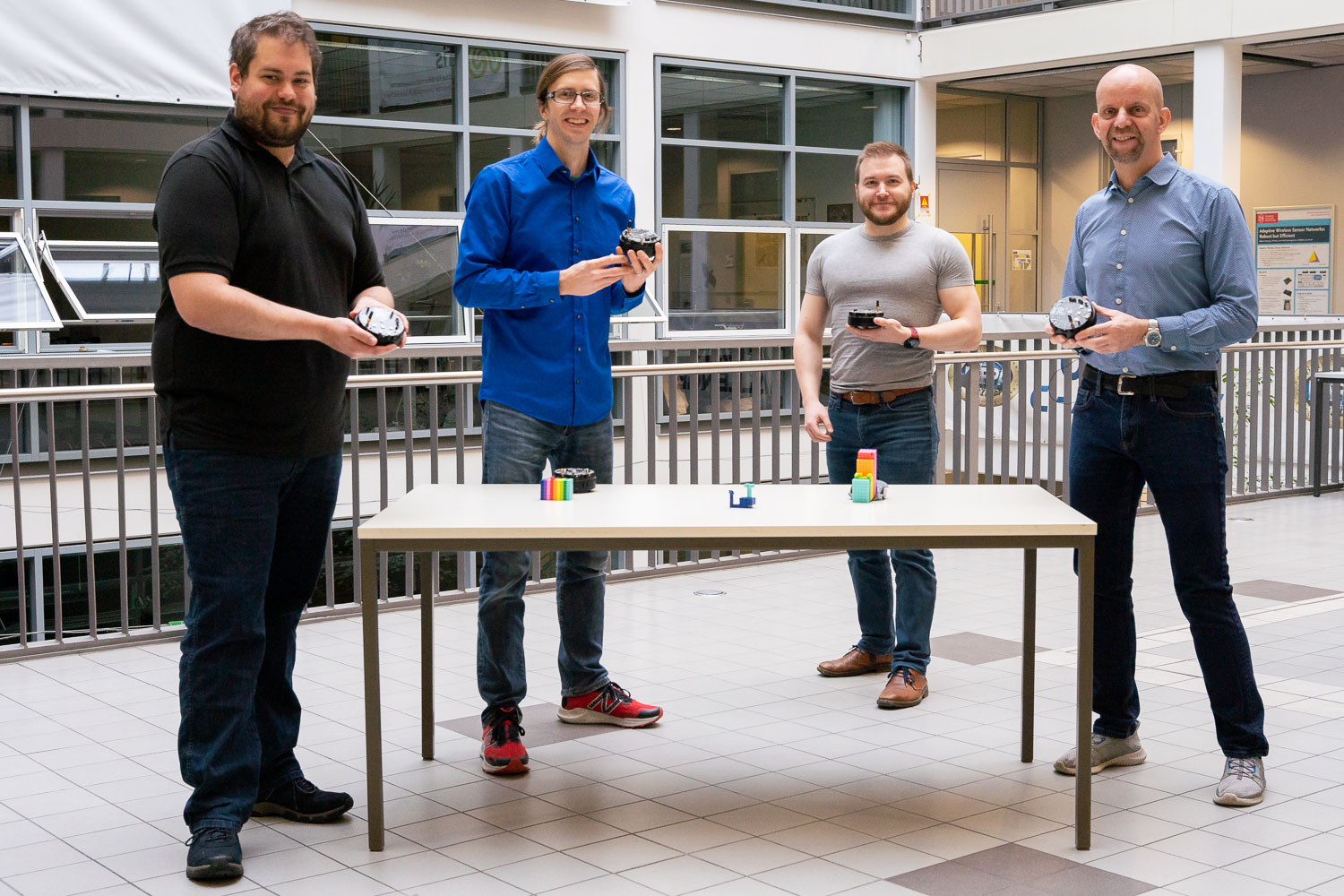With the whole family in Germany Computer Engineer Aaron Becker from Texas is visiting professor at TU Braunschweig
“The ‘kitchen’ in our new apartment is an empty room without even a sink!” That was one of the first hurdles Aaron Becker from the University of Houston in the U.S. state of Texas stumbled over when he arrived in Germany in the summer of 2021. Together with his wife Elana and their four sons, he is in Braunschweig until late summer as part of a sabbatical year, working as a visiting professor with Professor Sándor Fekete in the Algorithmics Department at the Institute of Operating Systems and Computer Networks. Since January 2022, his stay has been supported by a scholarship from the Alexander von Humboldt Foundation.

Aaron Becker’s research focus is figuring out how swarms of tiny robots could be used in medicine. To make progress toward this vision they are studying techniques to self-assemble magnetic cubes to form desired shapes. Photo: Markus Hörster/TU Braunschweig
Ten years ago, during his time as a postdoc, he met his host Professor Sándor Fekete as part of a joint research project. Fortunately, videoconferencing was already common in computer science at the time. The two stayed in touch and have worked together regularly ever since. Their collaboration now boasts more than 30 joint publications. They also have a series of videos that explain complex topics in a clear and sometimes musical way. In several of these videos Becker’s children demonstrate their talents and frustrations in front of the camera.
The kitchen problem was quickly solved after a trip to a popular Swedish furniture store. Then the next challenge was already on the horizon: the battle with German bureaucracy. “That’s where Germany lives up to its reputation,” laughs the researcher. Fortunately, the family was actively supported by the TU and the city of Braunschweig.
“Professor Fekete and Ute Marchot, secretary at the Institute of Operating Systems and Computer Networks, helped us find an apartment even before we arrived. Annika Ewe from the TU Braunschweig’s ‘Mobile Researchers’ Services’ team also helped us repeatedly with various bureaucratic obstacles. And even beforehand, Mona Firley from the education office of the city of Braunschweig organized virtual school visits for our boys.” There are numerous things to consider during such stays abroad, such as international tax treaties to avoid double taxation.

Ten years ago, Aaron Becker met his host Professor Sándor Fekete as a postdoc during a joint research project. Photo: Markus Hörster/TU Braunschweig
The “Mouse” already works without subtitles
Another hurdle: German grammar. “Together with my wife, we successfully completed an eight-week intensive German course at the Volkshochschule Braunschweig in December”, says Aaron Becker. “Thanks to the German public schools, our children have a better handle on the German language than we do and regularly point out our mistakes.” Like generations before them, the Becker family discovered the “Sendung mit der Maus”, a popular show for children on German public TV. “We no longer have to turn on the subtitles,” says Aaron Becker proudly. Of course, his children, two of whom go to elementary school and the older ones to secondary school, find English lessons particularly easy.
Stone houses
When he spent a week in Hamburg for a conference in 2015, Aaron Becker visited Braunschweig for a day for the first time. “There is so much history to discover here,” says the researcher, impressed by the city. He has already explored all the parks with his family. “And when I look out the window from my office in the computer science center, I immediately see: I’m in Germany. How do I recognize that? The houses are made of stone with red clay tile roofs!” In his home country, most homes are wooden structures with asphalt shingles.
Thanks to Europe’s extensive train system, the Beckers have also been outside of Braunschweig. “During the summer vacation we explored Split in Croatia, and during the fall vacation we spent a week on the German island Sylt in the North Sea.” The family has also explored Hamburg, Bremen, and the Harz mountains.

The Becker family regularly explores Braunschweig and the surrounding area. On the Steinberg Tower near Goslar, they enjoyed the view over the Harz Mountains. Photo: Aaron Becker/TU Braunschweig
Aaron Becker also planned to use his time in Europe to attend various conferences. “However, the Corona pandemic is not making that easy. I hope to go to the International Symposium on Computational Geometry (SoCG) in Berlin in June. That would be the first European conference that I can attend in person during my stay in Germany. All the others, unfortunately, only took place virtually.”
Swarm robotics in medicine
Aaron Becker’s research focus is figuring out how swarms of tiny robots could be used in medicine. “Getting a robot inside the human body requires an opening the same size as the robot. We’re studying controlled self-assembly techniques, so that we can insert tiny robot components into the body, and then combine them into a larger tool at the site of the problem.” This could make healing from surgeries easier in the future. To make progress toward this vision they are studying techniques to self-assemble magnetic cubes to form desired shapes. We use mods of the popular computer game “Minecraft” to simulate construction techniques and test out configurations. “This helps me score points with my sons,” says Becker.
“One of my motivations for coming to TU Braunschweig was also to learn from my colleagues. Prof. Fekete’s Algorithmics Department has particular expertise in the area of distributed and geometric algorithms. We complement each other well,” Becker says. “Aaron’s focus is more on applications, while we are primarily theoreticians,” explains Professor Sándor Fekete. “By working together, we are making progress in both areas,” Fekete says.
The American is particularly impressed by his collaboration with the students in Braunschweig: “The TU can be proud of its students,” emphasizes Aaron Becker. He says it’s fun to work with such committed young scientists. “That’s why I became a professor.”

Professor Aaron Becker with his host Professor Sándor Fekete (r.) and his colleagues Dr. Arne Schmidt (l.) and Dominik Krupke (second from right) in the Computer Science Center at TU Braunschweig. Photo: Markus Hörster/TU Braunschweig
Spring is asparagus season
In the near future, the Beckers plan to continue exploring Braunschweig and the surrounding area. The family was thrilled with the Braunschweig Christmas Market but is now looking forward to the coming months as well. “It’s a wonderful place to experience the seasons. We don’t have that back home in Texas. I’m looking forward to the blossoms in the spring and asparagus season!” And he is looking forward to visitors from his home country: If everything goes according to plan and the pandemic situation permits, two of his doctoral students from Houston will come to Braunschweig in the summer to work here on site.
Professor Aaron Becker and his family will return to the USA in August. But it is already clear that the close collaboration with Professor Sándor Fekete and his team will continue.
